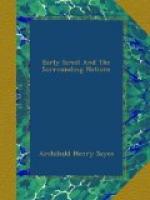But he was fond of social entertainments, and Egyptian cookery and confectionery were famous throughout the world. Table and guests alike were adorned with fragrant flowers, and musicians and singers were called in to complete the banquet. The house was surrounded by a garden, if possible, near the river. It was open to the air and sun. The Egyptian loved the country, with its fresh air and sunshine, as well as its outdoor amusements—hunting and fishing, fowling and playing at ball. Like his descendants to-day, he was an agriculturist at heart. The wealth and very existence of Egypt depended on its peasantry, and though the scribes professed to despise them and to hold the literary life alone worth living, the bulk of the nation was well aware of the fact. Even the walls of the tombs are covered with agricultural scenes. In one of them—that of Pa-heri, at El-Kab—the songs of the labourers have been preserved. Thus the ploughmen sing at the plough: “’Tis a fine day, we are cool, and the oxen are drawing the plough; the sky is doing as we would; let us work for our master!” and of the reapers we read: “In answering chant they say: ’Tis a good day, come out to the country, the north wind blows, the sky is all we desire, let us work and take heart.” The best known, however, of the songs, is that sung by the driver of the oxen who tread out the corn, which was first deciphered by Champollion—
“Thresh away, oxen, thresh away faster,
The straw for yourselves, and the grain for your master!”
Such were the Egyptians and such was Egypt where the childhood of Israel was passed. It was a land of culture, it was a land of wealth and abundance, but it was also a land of popular superstition and idolatry, and the idolatry and culture were too closely associated in the minds of the Israelites to be torn apart. In turning their backs on the Egyptian idols, it was necessary that they should turn them on Egyptian civilisation as well. Hence it was that intercourse with Egypt was forbidden, and the King of Israel who began by marrying an Egyptian princess and importing horses from the valley of the Nile, ended by building shrines to the gods of the heathen. Hence, too, it was that the distinctive beliefs and practices of Egypt are ignored or disallowed. Even the doctrine of the resurrection is passed over in silence; the Pentateuch keeps the eyes of the Israelite fixed on the present life, where he will meet with his punishment or reward. The doctrine of the resurrection was part of the faith in Osiris, Isis, and Horus, and Yahveh of Israel would have no other god beside Himself.
Moreover, the Israelites saw but little of the better side of the Egyptians. They lived in Goshen, on the outskirts of northern Egypt, where the native population was largely mixed with foreign elements. When they first settled there the Pharaoh and his court were Asiatic or of Asiatic descent. And in later days the rise of a purely native government meant for them a bitter bondage and the murder of their children. Between the Israelite and the Egyptian there was hostility from the first; Joseph began by confiscating the lands of both peasant and noble; the natives revenged themselves by reducing his kinsfolk to a condition of serfdom, and the last act in the drama of the Exodus was the “spoiling of the Egyptians.”




